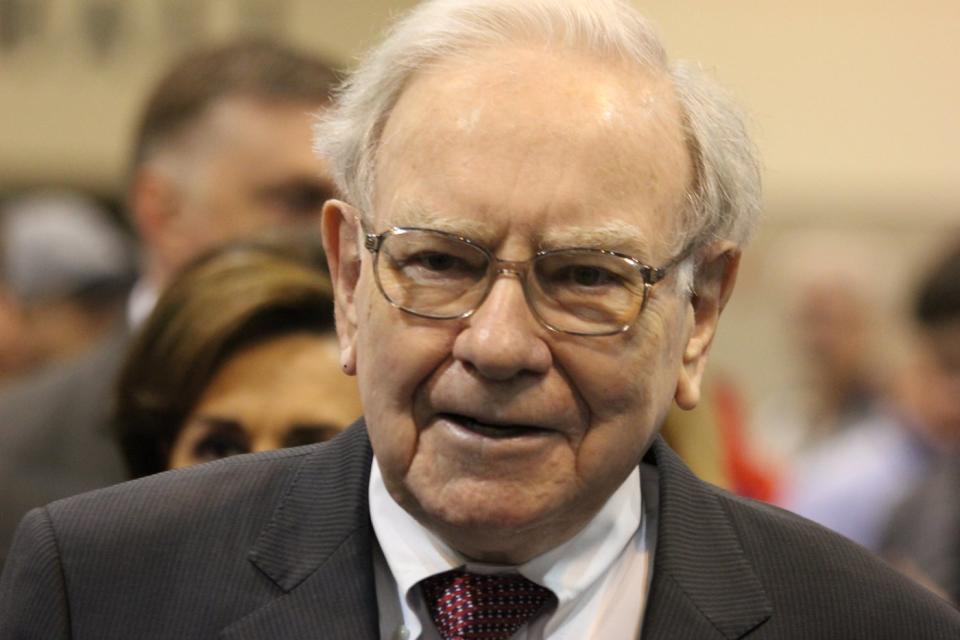Should You Buy Berkshire Hathaway Stock While It's Below $465?
Berkshire Hathaway's (NYSE: BRK.A) (NYSE: BRK.B) stock has rallied more than 20% over the past 12 months, and only trades about 3% below its all-time high. Warren Buffett's diversified conglomerate generated those steady returns even as inflation, elevated interest rates, and geopolitical conflicts rattled the broader markets.
Investors might be wary of chasing that rally, but Berkshire's Class B shares are still trading below Wall Street's target-price range of $465 to $506. Should investors load up on this evergreen stock before it reaches that lowest price target?

What makes Berkshire Hathaway a resilient investment?
A young Warren Buffett bought his first shares of Berkshire Hathaway, which was a struggling textile maker at the time, for his fund in 1962. Buffett eventually acquired the entire company in 1965, liquidated its textile division, and transformed it into a diversified conglomerate with acquisitions and investments across a broad range of industries.
Berkshire Hathaway initially focused on acquiring cash-rich insurance companies, and it now owns major insurers like GEICO, Gen Re, and Alleghany. Its wholly owned insurance underwriting and insurance-investment subsidiaries generated 40% of its total operating earnings in 2023. The remaining 60% came from its other subsidiaries, which mainly include companies across the railroad, utility, energy, and consumer staples sectors. Here's how its core businesses fared over the past two years.
Operating Earnings by Segment | 2022 | 2023 | Growth |
|---|---|---|---|
Insurance Underwriting | ($30 million) | $5.43 billion | N/A |
Insurance Investment Income | $6.48 billion | $9.57 billion | 48% |
Railroads | $5.95 billion | $5.09 billion | (14%) |
Utilities and Energy | $3.90 billion | $2.33 billion | (40%) |
Other Businesses & Misc. | $14.55 billion | $14.94 billion | 3% |
Total | $30.85 billion | $37.35 billion | 21% |
Data source: Berkshire Hathaway.
Last year, the robust growth of its insurance underwriting and investment units offset the macro-induced headwinds for its other non-insurance subsidiaries. Those trends boosted its operating earnings 26% year over year in the first half of 2024.
Berkshire Hathaway's operating earnings notably exclude any gains or losses from its closely watched investment portfolio, which includes nearly 50 stocks and exchange-traded funds (ETFs). Those investments can cause its net earnings to fluctuate wildly from year to year, so Buffett usually tells his investors to prioritize its operating earnings over its reported earnings per share (EPS).
Berkshire Hathaway's business might seem sprawling and complicated, but its core strategies are easy to understand. It generates a lot of cash through its wholly owned subsidiaries, and it invests a lot of that capital back into its investment portfolio and short-term treasuries. It also regularly prunes its investment portfolio to raise extra cash. That's why it ended the second quarter with a whopping $277 billion in cash and equivalents.
Berkshire Hathaway isn't an exciting growth stock, but its broad diversification and strong cash-flow growth make it an appealing alternative to an S&P 500 index fund. It's also an ideal stock for investors to buy, hold, and simply forget about.
Is Berkshire Hathaway still cheap enough to buy?
With an enterprise value of $1.01 trillion, Berkshire Hathaway only trades at 3.6 times its cash holdings. Apple (NASDAQ: AAPL), which Berkshire Hathaway holds a major stake in, trades at 21.6 times the $153 billion in cash and equivalents it held in its latest quarter.
Berkshire Hathaway trades at 19 times forward earnings, but that multiple is pegged to its fluctuating investment portfolio. But if we assume it grows its operating earnings by just 20% this year, then it trades at less than 23 times that estimate.
Looking ahead, let's assume Berkshire Hathaway continues to grow its annual operating earnings at a modest compound annual growth rate (CAGR) of 15% from 2023 to 2030. If it maintains that momentum, its operating earnings could reach $100 billion by the final year. If it trades at 20 times that figure, its enterprise value would roughly double to $2 trillion by the end of the decade.
A lot of things could happen over the next few years. The market could crash, geopolitical conflicts could worsen, and Buffett's successor Greg Abel might make a few mistakes after he takes the helm. But if you believe Berkshire Hathaway can leverage its scale to overcome those challenges, then it's a good idea to buy its evergreen stock before it hits Wall Street's lowest price target.
Should you invest $1,000 in Berkshire Hathaway right now?
Before you buy stock in Berkshire Hathaway, consider this:
The Motley Fool Stock Advisor analyst team just identified what they believe are the 10 best stocks for investors to buy now… and Berkshire Hathaway wasn’t one of them. The 10 stocks that made the cut could produce monster returns in the coming years.
Consider when Nvidia made this list on April 15, 2005... if you invested $1,000 at the time of our recommendation, you’d have $668,029!*
Stock Advisor provides investors with an easy-to-follow blueprint for success, including guidance on building a portfolio, regular updates from analysts, and two new stock picks each month. The Stock Advisor service has more than quadrupled the return of S&P 500 since 2002*.
*Stock Advisor returns as of August 12, 2024
Leo Sun has positions in Apple. The Motley Fool has positions in and recommends Apple and Berkshire Hathaway. The Motley Fool has a disclosure policy.
Should You Buy Berkshire Hathaway Stock While It's Below $465? was originally published by The Motley Fool
